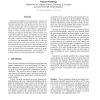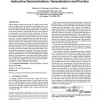1047 search results - page 5 / 210 » Learning the required number of agents for complex tasks |
ICMAS
2000
13 years 9 months ago
2000
This paper investigates the computational complexity of a fundamental problem in multi-agent systems: given an environment together with a specification of some task, can we const...
ATAL
2003
Springer
14 years 26 days ago
2003
Springer
Among humans, teaching various tasks is a complex process which relies on multiple means for interaction and learning, both on the part of the teacher and of the learner. Used tog...
BPM
2006
Springer
13 years 11 months ago
2006
Springer
Dynamic assembly of complex software is possible through automated composition of web services. Coordination scripts identify and orchestrate a number of services to fulfil a user ...
AAMAS
2005
Springer
13 years 7 months ago
2005
Springer
Cooperative multi-agent systems are ones in which several agents attempt, through their interaction, to jointly solve tasks or to maximize utility. Due to the interactions among t...
WOA
2001
13 years 9 months ago
2001
Acting in a dynamic environment is a complex task that requires several issues to be investigated, with the aim of controlling the associated search complexity. In this paper, a l...


